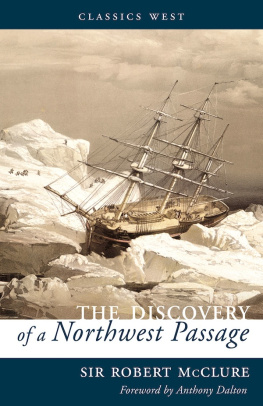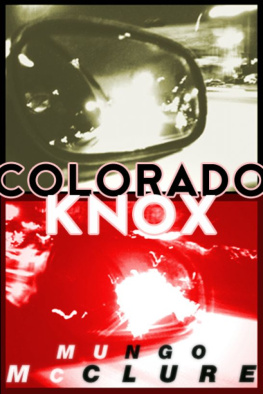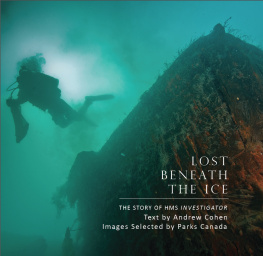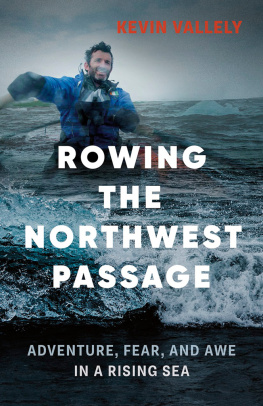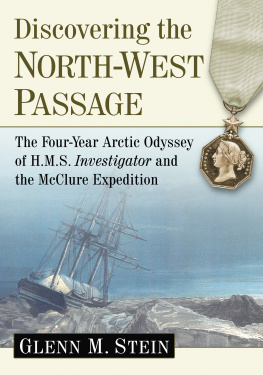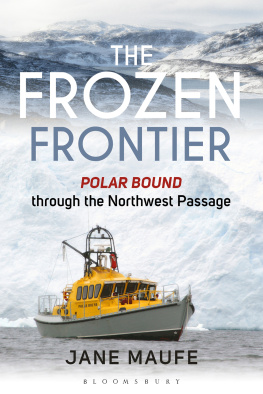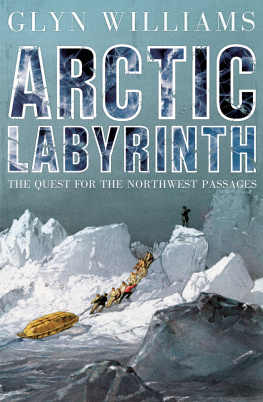Sir Robert McClure - The Discovery of a Northwest Passage
Here you can read online Sir Robert McClure - The Discovery of a Northwest Passage full text of the book (entire story) in english for free. Download pdf and epub, get meaning, cover and reviews about this ebook. year: 2013, publisher: Touchwood Editions, genre: Adventure. Description of the work, (preface) as well as reviews are available. Best literature library LitArk.com created for fans of good reading and offers a wide selection of genres:
Romance novel
Science fiction
Adventure
Detective
Science
History
Home and family
Prose
Art
Politics
Computer
Non-fiction
Religion
Business
Children
Humor
Choose a favorite category and find really read worthwhile books. Enjoy immersion in the world of imagination, feel the emotions of the characters or learn something new for yourself, make an fascinating discovery.
- Book:The Discovery of a Northwest Passage
- Author:
- Publisher:Touchwood Editions
- Genre:
- Year:2013
- Rating:4 / 5
- Favourites:Add to favourites
- Your mark:
- 80
- 1
- 2
- 3
- 4
- 5
The Discovery of a Northwest Passage: summary, description and annotation
We offer to read an annotation, description, summary or preface (depends on what the author of the book "The Discovery of a Northwest Passage" wrote himself). If you haven't found the necessary information about the book — write in the comments, we will try to find it.
The Discovery of a Northwest Passage — read online for free the complete book (whole text) full work
Below is the text of the book, divided by pages. System saving the place of the last page read, allows you to conveniently read the book "The Discovery of a Northwest Passage" online for free, without having to search again every time where you left off. Put a bookmark, and you can go to the page where you finished reading at any time.
Font size:
Interval:
Bookmark:
Introduction.
The successful realisation of the project so long cherished in Great Britain, of the discovery of a way through the Arctic Ocean to the Indiesthe final solution of a problem sought through many an arduous struggle during the course of three hundred yearsis what it is our present duty to chronicle; and we may be permitted, in the first place, briefly to remind the reader of the reasons that made such a voyage desirable.
On looking at the surface of the globe, it will be seen at a glance that Hindostan, China, and Japanthe Ophirs of the Old Worldare placed, geographically speaking, with respect to Western Europe, in the most distant and inaccessible position.
Turn to an ancient atlas, and think of the antres vast and deserts idle that lay between India and Europe, and we can better appreciate the forays of the great Macedonian, the difficulties he encountered, and the genius which, in mastering them, raised him to the rank of a demigod among his countrymen. Yet Alexander left no footprints east of the Indus.
The legions of imperial Rome failed to carry their conquering eagles to a region which they must have been fully aware contributed largely to the enormous wealth of Jerusalem, Judea, and Egypt. Even Roman ambition was checked by the difficulties of the route.
The Mohammedan, more fortunate in his central position, served for ages to act as the medium of transit for the spices and products of the East to Western Europe, whither the Crusader carried back a knowledge of and taste for luxuries previously unknown,a knowledge which created new wants, and excited the mercantile and nautical skill of nations dwelling upon the shores of the Mediterranean. Venice and Genoa rose to greatness upon their lucrative trade with the East; and the fact soon came home to the common sense of their neighbours, and awakened the desire to supplant them, or share in their profits.
In the middle of the thirteenth century, Marco Polo brought back to Western Europe such glowing accounts of the East as verified all the traditionary tales of Cipango and Cathay. Enterprise and cupidity were aroused. The Portuguese slowly but successfully proceeded along that African shore which, as they knew, touched Asia upon the Mediterranean Sea, and which they naturally inferred would eventually lead them to the prize, if they followed it in an opposite direction.
Columbus, with more genius, ascribed to the Indies a vast extent of eastern longitude; and then deduced, from certain traditionary accounts of a land lying west of Iceland (whither he had traded), that by sailing in that direction from the Isle of Fayal he would secure to the prince that should employ him possession of the Indies. Columbus sailed eventually under Spanish auspices, and discovered a land which he fondly imagined was the long-wished-for Eastern continent.
England, not less than Spain and Portugal, was excited to maritime adventure by the wonderful discovery of the Americas, then supposed to be the eastern seaboard of the long-sought Indies. These Indies, in the mean time, were actually reached by the Portuguese, under Vasco de Gama, by way of that Cape of Torments flatteringly named by John II. Cabo da Boa Esperza.
Before a century had passed, however, both Spaniards and Englishmen found that a wide ocean lay between that Western continent and Cathay; and although the Spaniard could reach the latter by rounding the continent of America at the Strait of Magellan, yet he forbade all others the right to risk the adventure, and treated as pirates all of our countrymen who dared approach the Great South Sea. The Portuguese, in like manner, monopolised the route round the Cape of Good Hope, and both added to the danger that awaited the English navigator in his efforts to share the booty of the East.
John Cabot, who, in the service of Henry VII., had secured for Britain a title to American discovery, left a son, Sebastian, whom Edward VI. wisely patronised. With this man seems first to have originated the idea of reaching the coveted land by taking a north-about route through polar seas, and thus avoiding the dangers of the great sea voyage by either of the southern capes.
Our seamen, accustomed to the hardships and cold of northern latitudes, feared the frigid as little or less than the torrid zone; and just forty years after Nunez de Balboa waded into the sea at Panama, and, striking it with his sword, claimed the broad Pacific as the property of Spain, the first English arctic expedition sailed to achieve a north-east passage to Cathay.
On May 10, 1553, three ships left Greenwich, under Sir Hugh Willoughby, and were rewarded by discovering Novaia Zemlia and the White Sea; but the subsequent melancholy fate of the admiral and his crew, who were frozen or starved to death in Lapland, checked the national enthusiasm; and although two more attempts were made in the same direction, they were equally unsuccessful. The Dutch, like ourselves, anxious to share in the wealth of the Indies, so jealously watched by Spaniards and Portuguese, tried to reach them by a north-east route: their countryman Barentz perished in gallant and unavailing attempts to carry out their wishes; and after him England made two slight efforts in the same direction under Hudson and Cherie, and then turned her attention in the opposite one. Prior to the time of Barentzs last north-eastern expedition, the first north-west voyage had already been attempted from Great Britain.
Martin Frobisher, a seaman of Queen Elizabeths time, was the first to call attention to the possibility of reaching the East, Cipango, and Cathay, by passing north of America. For fifteen years he patiently urged his ideas upon the consideration of his countrymen, and at last, in 1576, in the reign of Elizabeth, he sailed to commence that work which the seamen of England only completed in 1854, or two hundred and seventy-four years afterwards, in the reign of Queen Victoria.
It is not our purpose to follow Frobisher, Davis, Hudson, and Baffin, through their adventures and discoveries. Our charts of the present day, on which the localities they discovered bear their respective names, sufficiently attest the amount of the additions they made to our geographical knowledge; but when the last-named great navigator, Baffin, returned in 1616 from the most successful of his voyages, the North-West Passage was still, as Martin Frobisher said, a thing yet undone, wherebye a notable mind might be made famous and fortunate.
Years elapsedmens minds took another turntimes changedthe maritime supremacy of Britain gradually developed itself. If Spain could boast of her Magellan, England had had her Drake.
The tide of fortune now flowed slowly in favour of our hardy race of seamen. Along the seaboard of Spanish America, whether in the Atlantic or Pacific Oceans, the English seamen slowly but steadily established their pre-eminence; and within a brief period from the date of the first Indian cargo being exposed in Leadenhall Market, a footing was obtained in India, and the foundation of our eastern empire firmly established.
From 1632, when Captains Fox and James discovered those northern localities by the names of which their memories have still been preserved, a century elapsed before the attempt to discover a north-west passage to India was resumed. Even then, although a reward of 20,000 was offered, the attempts of Scroggs, Dobbs, and Middleton, in 174041, yielded no better fruit than many of our modern voyages,a vast deal of writing, exaggerated accounts of difficulties, and no results of any value.
Captain Cooks success in the South Seas, and, indeed, wherever he went, led the nation to hope that he might be the man fated to secure to his country the honour of a discovery which was then desired on commercial as well as geographical grounds. He failed, however, in penetrating the ice, and well was it for himself and his crews that it was so; the fate of Sir Hugh Willoughby would assuredly have befallen them, unprepared as they were for such a voyage, and the rigours of such a climate.
Font size:
Interval:
Bookmark:
Similar books «The Discovery of a Northwest Passage»
Look at similar books to The Discovery of a Northwest Passage. We have selected literature similar in name and meaning in the hope of providing readers with more options to find new, interesting, not yet read works.
Discussion, reviews of the book The Discovery of a Northwest Passage and just readers' own opinions. Leave your comments, write what you think about the work, its meaning or the main characters. Specify what exactly you liked and what you didn't like, and why you think so.

